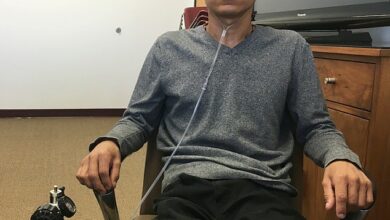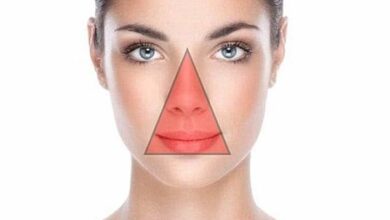Does NOT washing your hands after using the toilet really help you get “vaccinated” against E. coli, as US Olympic triathlete Seth Rider claims?




Experts have criticised an Olympic triathlete after he admitted he stopped washing his hands as part of the warm-up before swimming in the Seine.
American athlete Seth Rider claimed that he ‘tried to increase my E. coli threshold by exposing myself to a little bit of E. coli in everyday life’.
The bacteria — found in water — usually causes fever, nausea and diarrhea. The symptoms usually go away on their own within a few days.
Scientists reacted angrily, calling the method “absurd” and “downright dangerous,” saying there was “no scientific basis for this bizarre strategy.”
This comes as the men’s individual triathlon at this year’s Olympic Games was postponed on Tuesday after required hygiene standards were not met in the Seine in Paris.

American athlete Seth Rider (pictured) claimed he was “trying to increase my E. coli threshold by exposing myself to a little bit of E. coli in my daily life.” The bacteria — found in water — usually causes fever, nausea and diarrhea. Symptoms usually resolve on their own within a few days

Mr Rider said: ‘We know there’s going to be some exposure to E.coli. So I try to increase my E.coli threshold by exposing myself to a little bit of E.coli in my daily life.’ The 27-year-old added: ‘Just little things throughout the day, like not washing your hands after you’ve been to the toilet and things like that.’

Experts have long worried about Shiga toxin-producing E. coli (STEC), a rare strain of the diarrhea-causing bacteria. STEC is considered extremely contagious, and in up to 15 percent of cases, the bacteria can cause hemolytic uremic syndrome (HUS), a life-threatening condition that can lead to kidney failure.
Mr Rider said: ‘We know there will be exposure to E. coli.
“I try to increase my E.coli threshold by exposing myself to a little bit of E.coli in my daily life.”
The 27-year-old adds: ‘Just little things throughout the day, like not washing your hands after you’ve been to the toilet and things like that.’
However, Professor Paul Hunter, a renowned infectious diseases expert at the University of East Anglia, told MailOnline: ‘That is absolute nonsense.
‘E. coli rarely causes illness, but if E. coli is present in the water, there is a good chance that other nasty bacteria are also present.
“We already carry E. Coli in our intestines. So ‘building tolerance to E. Coli’ would not reduce the risk of these other pathogens that may be in the water.
‘Washing hands after using the toilet is mainly intended to prevent you from infecting others if you are already infected.
‘So what he does will not reduce his own risk, but it may actually increase the risk for others.’
Professor Christopher Stewart, Head of Human Microbiome Research at Newcastle University, said: ‘Some strains of E. coli cause serious infections.
‘There is no scientific evidence for this bizarre strategy and the promotion of sloppy hygiene is downright dangerous.’
Dr Simon Clarke, a microbiologist at the University of Reading, told MailOnline: ‘It is absurd to suggest that lowering your personal hygiene is a way to protect yourself from exposure to dangerous pathogens.
‘The presence of E. coli in water contaminated with sewage is also an indicator of the amount of other pathogens, so the risk extends much further.
‘E. coli can cause much more serious illness than just an upset stomach. It can lead to kidney failure, and it’s important to remember that sewage also carries other nasty things, like tapeworms and hepatitis.’
Experts have long been concerned about Shiga toxin-producing E. coli (STEC), a rare strain of the bacteria that causes diarrhea.
STEC is considered extremely contagious and in as many as 15 percent of cases the bacteria can cause hemolytic uremic syndrome (HUS), a life-threatening condition that can lead to kidney failure.
A small proportion of adults may develop a similar condition, called thrombotic thrombocytopenic purpura (TTP).
Dr Mato Lagator, an expert in bacterial evolution and their ability to become resistant at the University of Manchester, told MailOnline: ‘E. coli is a very diverse bacterial ‘species’, most members of which are not pathogenic.
‘It is unlikely that ingesting random E. coli strains will lead to acquiring pathogenic strains.
‘And even if that were the case, it is unlikely that those strains would be captured in sufficient quantities to survive the acidity of the stomach and reach the intestines.
‘And at least as important, the immune system of adults does not develop immunity against E. coli, as it does against some viruses, for example.’
Rider is not among the favourites to win a medal in Paris, but Team GB’s Alex Yee is being backed to win his first individual gold, following his silver medal in Tokyo at the 2020 Games.
According to World Triathlon Federation standards, E. coli levels above 900 colony forming units per 100 milliliters are considered unsafe.
Organizers had the option to drop the swim and make the event a duathlon, but it will go ahead as planned today.
To purify the water, a large basin was constructed, among other things, to collect rainwater and prevent waste water from entering the river.
The sewerage system was also renovated and the wastewater treatment plants were modernised.
However, the organizers knew that heavy rainfall in the days before the race could still increase the concentration of the harmful bacteria E. coli.
Swimming in the Seine, which crosses the city, has been prohibited since 1923.
Last year, at least 57 athletes fell ill with diarrhoea after swimming in the sea during the World Triathlon Championships in Sunderland.
About 2,000 people took part in the major tournament last August at Roker Beach, which two years ago received the prestigious Blue Flag award for its beauty.
A test carried out by the UK Environment Agency just three days before the event found 3,900 E. coli colonies per 100ml, almost 40 times higher than typical levels in June.
British Triathlon, which organises official triathlons in the UK, said these results were only published after the event had taken place and that the testing was carried out outside the area where the sea swimming event took place.




